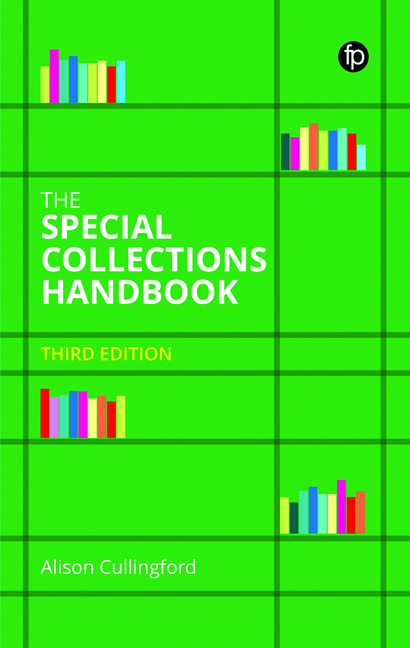Book contents
13 - Managing Special Collections People
Published online by Cambridge University Press: 28 April 2022
Summary
Introduction
None of the activities in previous chapters can happen unless the library has people with the right skills and mindsets to carry them out. This chapter explores the world of Special Collections staff, along with volunteers and how to work effectively with them.
This chapter covers:
1 Introduction to Special Collections staffing.
2 Staff functions, roles and staffing models.
3 Managing in difficult times.
4 Knowledge transfer and succession planning.
5 Toxicity in work and the profession.
6 Managing volunteers and interns.
7 Microvolunteering and crowdsourcing.
8 Suggestions for further reading and useful websites.
Introducing Special Collections people
Special Collections people are as important an asset as the collections themselves. People make the difference between neglected hidden collections and star collections fulfilling their potential. Managing people is a skill required in every profession, this chapter therefore concentrates on the distinctive qualities of staffing Special Collections.
Functions and staffing models
To achieve their mission, all Special Collections services require staff whose responsibilities cover the elements discussed in this book and at all levels: strategy/policy, planning and operational. Figure 13.1 on the next page shows some typical roles in this context.
Special Collections come in all shapes and sizes, but the following staffing models are common:
1 Tiny teams (Type 1 on the Archive Accreditation scale). A ‘lone arranger’ or ‘solo librarian’, sometimes with some support staffing; can expand temporarily with project funding. Often found in newer universities and colleges and historic libraries.
2 Big departments (Type 2 on the Accreditation scale). National and research libraries. Sufficient levels of staffing to have specialist roles. In the UK, the difference between research libraries (average 19 staff) and other Special Collections (average 7) is striking (Dooley et al., 2013).
The larger services usually reflect a long history of collecting Special Collections and have huge collections, from papyri to digital. Smaller services usually (though not always) have more homogeneous collections and are often either very old (Oxbridge colleges, cathedral libraries) or very new (modern universities and colleges). Both kinds of service can provide excellent care and services to users.
Tiny teams and lone arrangers
Tiny services can provide a highly personalised service and their obvious small scale helps manage user expectations. They can be flexible and nimble in responding to new opportunities and creative in responding to lack of resources.
- Type
- Chapter
- Information
- The Special Collections Handbook , pp. 309 - 324Publisher: FacetPrint publication year: 2022



